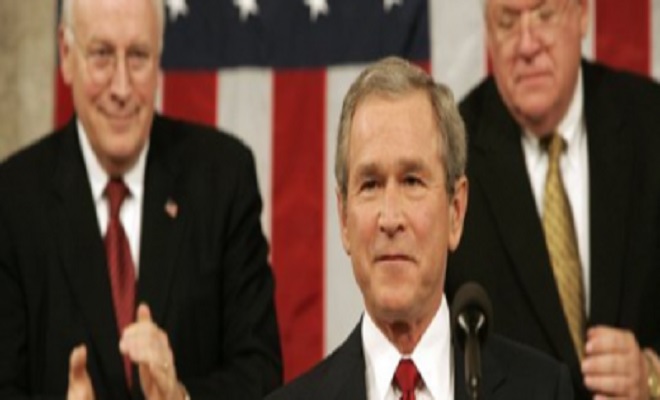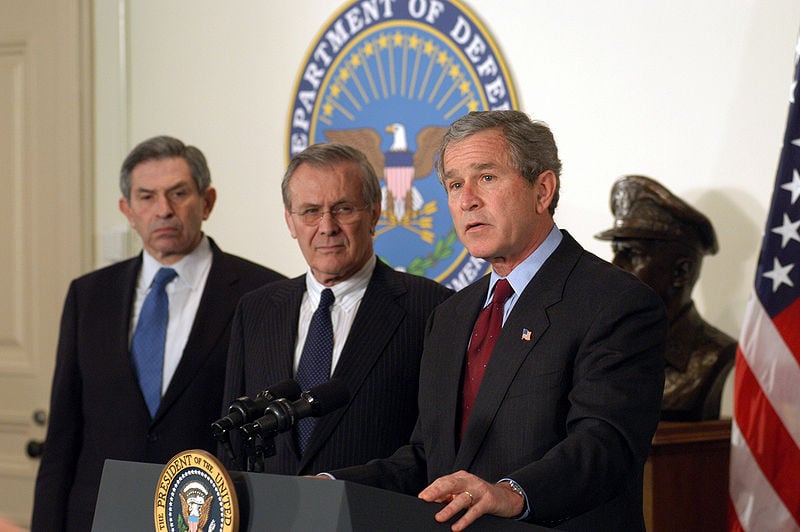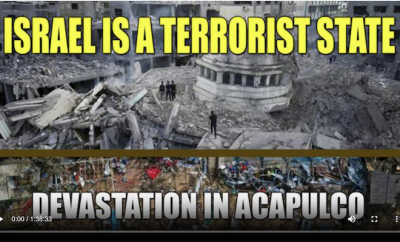 Global Research
Global Research
Featured
War Crimes in Iraq: Bush, Cheney, Rumsfeld Et Al and the Long Quest for Justice
by Steven Jones, Global Research.ca:
San Francisco attorney Inder Comar didn’t initially strike me as a human rights crusader working to bring accountability to arguably the most powerful political office in the world. Maybe it was the setting.
Comar works out of a small, glass-walled office in the Impact Hub, the spot that the tech industry has carved out of the San Francisco Chronicle Building, replacing the newspaper’s hollowed out core of journalists with start-up entrepreneurs seeking “synergy” and other business buzzwords, or just the next great app.
In fact, that’s most of what Comar does in his business law practice, collaborating with management consultants just down the bustling hallway to feed the current tech boom that is having such a huge impact on San Francisco, for good or ill. But the case that has propelled him onto the international stage, his pro-bono passion project, is Saleh vs. Bush, et al.
The lawsuit — which is based on Alien Tort Claims Act of 1789, but also leans on the Nuremberg Principles that the U.S. established to try and punish Nazi leaders after World War II — argues that Bush and company’s act of military aggression makes them civilly liable for the damages that Saleh and her family suffered when they were forced to flee to Jordan as the social order broke down following the invasion.
“She had a super middle class life and it all got destroyed,” Comar told me recently in his office,
The lawsuit was filed in March 2013 and it was dismissed by the federal district court in San Francisco in December 2014, based on the government’s claim that the President and other federal employees are immune from civil liability for the official acts, as spelled out in the Westfall Act and other assertions of sovereign immunity.
In its motion to dismiss, the government cited procedural reasons for tossing the case, sought to substitute the government for the former officials the case targeted, and wrote, “Saleh’s claims raise non-justiciable political questions that would require the Court to make determinations that are properly committed to the political branches of government.”
Yet Comar says that just because Congress and the Obama Administration haven’t had the stomach to delve back into this ill-advised march to war, a decision that is still dangerously rippling outward today, that doesn’t excuse actions that clearly violated international law and the Saleh family’s rights.
“In a functioning democratic system, the opposition party would help create that accountability, but that hasn’t happened,” Comar told me, noting the challenge that presents to the judicial branch. “That’s the biggest wall a judge will hit: ‘Who am I to do this?’”
Comar is now finishing up an appeal to the Ninth Circuit Court of Appeals (just two blocks down from his office) that he intends to file later this month, arguing that claims of immunity don’t apply to leaders who commit acts of aggression that are illegal under international law, particularly when those decisions were made under false pretenses (ie the stockpiles of weapons of mass destruction that didn’t actually exist).
“We allege in the case that it was fraud,” Comar said of Bush’s pretexts for the invasion. “This was not an error, this was a plan they had to go in regardless of the cost.”
It was a plan put into motion after the 9/11 attacks, but that saber-rattling against Iraq by the neocon think tank Project for the New American Century began back in 1997, when those who would later lead the Bush Administration’s war effort pledged to topple Saddam Hussein by any means necessary.
Eventually, Comar would probably have to prove the case for war was fraud to win the case, which doesn’t worry him: “Legally speaking, no one has ever told me this isn’t a strong case.” But he’s going to need to overcome the immunity issue before he ever gets to that point — a high but important bar to overcome.
That’s one reason why he’s been seeking to work with international experts, asking them to join him in establishing the body of legal work that will reinforce the ban on military aggression that was so central to the Nuremberg court’s work. “But no court has dealt with Nuremberg’s ban on aggression,” he told me.
Comar’s case does seem to have generated more interest in international circles that it has on U.S. soil, and last month he was invited to address the Kuala Lumpur Foundation to Criminalise War’s International Forum on Peace and Justice, along with former United Nations Humanitarian Coordinator for Iraq Hans von Sponeck and other luminaries.
Comar told the crowd that his appeal will rely heavily on the Numerberg Principles:
“With that as precedent, it’s quite amazing, actually, what might be possible, and a lot of where I’m coming from is as a student of Nuremberg, having learned about the Nuremberg case in law school, having studied it and read it now countless times, learning about the crime of aggression that was the chief crime prosecuted at Nuremberg.”
He also plans to cite the case that Spanish Judge Baltasar Garzón bought against former Chilean dictator Augusto Pinochet in the late 1990s, ordering Pinochet’s arrest and prosecution after rejecting Chile’s claim that its former leader enjoyed sovereign immunity for ordering the torture and killing of Spanish citizens.
“Pinochet is a very critical case because this issue is, I think, the final wall when we talk about accountability of leaders: the ability for a leader to claim some type of immunity. Right? This is what has to be, I think, destroyed in our minds and destroyed in the minds of judges once and for all. Why should immunity apply merely because someone was acting as a leader, if the act in question was illegal? That’s a key question,”
Comar told the gathering.
Meanwhile, Comar toils away in the Impact Hub, doing work that really could change the world, not through techno-gizmos, but through reinforcing the important but forgotten stand that a previous American generation made to prevent future wars and hold the leaders who launch them accountable.
“This is first time since Nuremberg that the issue of aggression is being raised in a U.S. court,” Comar said, noting how important it is to protect the principle that military aggression violates international law. “The whole reason we wanted those rules was to prevent another World War II.”
That’s a discussion that he said we should be having as a nation. As he told me, “From a realistic point of view, our chance of success goes up dramatically if there’s a political discussion around it.” So he’s been disappointed that President Obama is defending Bush and the acts of aggression that Candidate Obama called out and criticized at the time. “When you have Obama providing cover for this stuff, it hurts.”
But if the Ninth Circuit rules that domestic immunity doesn’t apply to Bush and his fellow warmongers, then the case will likely be considered on its merits in federal court.
“If we get that ruling, it’s the crack in the dam that you need,” Comar told me, “and once you get it, the water comes rushing through.”
It’s admittedly a long shot, but chipping away at the walls of power to create floods of justice, that’s San Francisco values at their best.
Read More @ Global Research.ca














